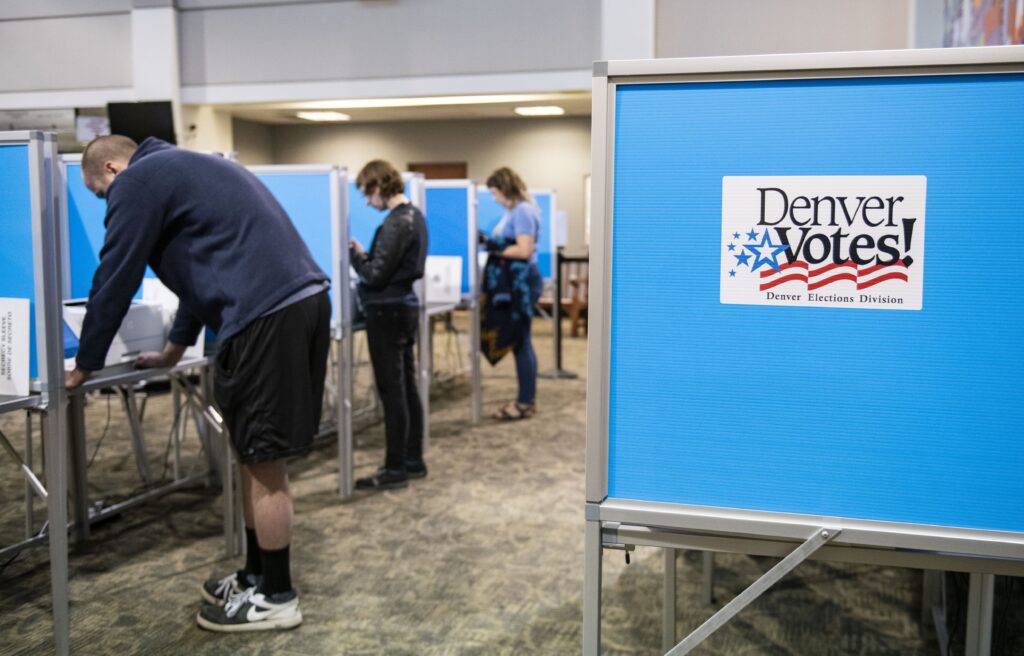Questions answered on Jeffco school board recall elections

Why is this Jefferson County school board election such a thing?
School boards positions have long been relatively high-profile local elected spots. Board members control a lot of local and state tax money. They are subject to the scrutiny of all of the voters related to anyone who has ever been a district student. Small-bore voter dissatisfactions fuel elections, as do clashes about education philosophy.
“People may not know about water reclamation or special tax districts, but they know about schools,” says Joe Watt, communications director for the Colorado Association of School Boards. “It’s not just that they have kids… In many cases they attended the local schools themselves.”
Beyond that, school board races increasingly are being driven by national ideological politics, where conservative and free-market “reformers” aim to break what they see as inefficient government control over tax dollars that limits choice for parents who, for example, want their tax dollars to go to the religious schools where they send their children. Conservatives are also concerned that tax dollars go to unionized teachers, whose dues overwhelmingly support pro-labor Democratic Party candidates.
This school board election — and others around the state — are of a piece with battles at the state Legislature and in courts about the Common Core national curricula standards, school voucher programs and the commitment among lawmakers to the state’s education budget, which has been drained of tens and hundreds of millions of dollars during hard times in order to fund other public programs.
On one hand, the Jefferson County School Board election is a charged local story about a board majority that many thousands of teachers and parents and students in the county feel doesn’t represent their interests. On the other, it’s part of a larger political fight tied to the fact that public education is a source of great cultural power and also a market-sector where billions of dollars flow, paying for teachers, administrators, counselors, buildings, books, lunches and so on. As with health care and energy, education is an area of public policy where free-market interests look to rally grassroots support to their cause, which is opening up greater swaths of the public sector to private interests. That’s one reason why organizations like the billionaire Koch brothers-funded Americans for Prosperity are launching issue campaigns and promoting position papers and backing local school board candidacies with the kind of money that used to be reserved for races for statewide offices. (AFP has also said it’s using school board elections to build an election machine — putting in place voter-data operations and get-out-the-vote mechanisms that can be used in next year’s election for president and other offices.)
The conservative three-member Jefferson County School Board majority — Ken Witt, Julie Williams and John Newkirk — has made national news repeatedly since winning election in 2013, most famously for proposed changes to Advanced Placement U.S. History course curriculum. The elections themselves, however, are also drawing national attention. They even generated a BuzzFeed listicle on all the ways school board elections still lie beyond the clean-campaign rules that govern most other elected offices in Colorado.
Didn’t Colorado just go through some big recall elections?
Yes. Democratic state lawmakers, in the wake of the Aurora theater and Newtown, Conn., shootings, passed gun-control laws in Colorado in 2013 that enraged gun-rights advocates and stoked intense activity on the part of conservative political groups, who worked to recall two Democratic state senators.
Those recall elections were the first of their kind in state history. Are school board recalls unusual?
No. School board recalls happen on a fairly regular schedule in Colorado and around the country. As noted above, school board elections have always drawn high interest among local voters (although supporters of the Jeffco recall lament that turnout was low two years ago when the conservative board majority won its seats). That there is also now high interest in school board elections among national ideological groups surely won’t translate into less frequent school board recall elections.
There have been 14 school board member recall efforts in Colorado since 2006, and those efforts have resulted in eight school board members being successfully ousted, according to Ballotpedia.
What lessons do both sides appear to have learned from the 2013 Senate recalls?
Major takeaways from the Senate recalls — in which Senate President John Morse, D-Colorado Springs, and Sen. Angela Giron, D-Pueblo, were both recalled and replaced with Republican candidates — were to try to land the recall on a regular election ballot so the movement doesn’t rely as heavily on strongly motivated voters alone to turn out. Anti-recall forces learned to be sure to put up alternative candidates (Morse and Giron supporters didn’t) in case any of the recalls succeed. That way, there’s still the chance your side will retain the seat or seats.
This is Jefferson County. Why do we keep hearing about Douglas County?
Politically conservative Douglas County, south of Denver, is Ground Zero in the state for the school reform movement. The experiment underway there, in a similarly large Front Range Colorado school district, has drawn the attention of education watchers around the nation. Many in the state see the Douglas County experience as a kind of crystal ball that presents a possible future for Jefferson County — a future to be either embraced or avoided.
In 2009, voters in Douglas County swept a conservative board majority into office in heated and expensive elections. The new board soon rolled out changes, including a voucher program that would pay for religious schools, a no-compromise negotiating position that broke the district teachers union and new budgeting practices that drew praise from free market champions and criticism from the other side.Two years later, conservatives won a majority in Jefferson County. The new board majority in Jeffco was seen by critics to be taking cues from Douglas County. In one of its first controversial moves, the new Jeffco board hired as superintendent Dan McMinimee, a longtime Douglas County administrator.
Teachers who have left Douglas County criticize new evaluation methods and attacks on job security. They say the board — for political or ideological reasons — is tinkering with a great school district. This year, school board elections in Douglas County are less a referendum on the candidates than they are a referendum on the reform movement as it has progressed so far.
“They’ve turned our great district upside down,” said Anne-Marie Lemieux, who is running to replace one of the board reformers. “This board isn’t necessarily bad guys. They’re just not asking the right questions.”
What have these school board members done that’s riled everyone up?
It isn’t just what the board majority members did. It’s how what they did and how they did it worked to feed anxiety over what their plans are for the district.
As mentioned above, education is a site of political struggle that goes to the core of what those involved in public education believe is the mission of public education in the country. Many public educators don’t just work as public school teachers, they believe the public school system is a pillar of democracy, as one of the best avenues to upward mobility. For some, public schools are another of the first-order pluralistic public services provided by the government of an immigrant nation, on a par with the military. They don’t generally believe that education should be shaped by “market forces” that work outside the realm of public accountability and that put profits high on the priority list.
Reformers looking to incentivize teachers by pitting them against each other in competition sounded warning bells that corporate values are paramount for the majority members. When the public in Jefferson County began to take notice of proposed reforms and began attending board meetings in large numbers, extending meeting times for hours, the reformers leaned on past rules and limited public comment. That seemed to many to run against the spirit of public education and open debate. It fueled speculation and rumor about closed-door decision-making engaged in by the board majority and the newly hired board lawyer.
Recall supporters say the board majority has created a bad working environment that spurred popular, nationally renowned former superintendent Cindy Stevenson to resign, teachers to flee for other districts and frustrated minority board members to break down in tears during meetings. (Recall opponents say Stevenson was already planning to retire and instead engaged in grandstanding to make a point. There’s also some dispute over whether Jeffco’s teacher turnover is much higher than the usual churn.)
Some of the claims made by supporters of the recall have been exaggerated. Some are based on misperceptions. But the main concern fueling anxiety in Jefferson County is over where the board majority aims to take the school district and, on that score, the board seems unable to quell anxiety. That’s at least partly because the board majority seems determined to lead the district along the reform path laid down in Douglas County, where employee collective bargaining and job security have both been weakened, courts have blocked plans to send tax money to private schools as unconstitutional and an increasing number of services may be outsourced to private-sector contractors.
What is performance-based pay and what could be wrong with that?
The teacher-performance evaluation system in Jefferson County, as in districts across the country, is a fraught topic, because it’s about fairness in a system where job-demands vary widely, and because it’s about money in a profession that is generally poorly compensated.
Many school systems base pay mostly on seniority. It’s an approach where salaries are easy to calculate and everyone knows where they stand and what to expect. But a strict seniority system doesn’t offer much in the way of incentives to push teachers to improve performance levels or to maintain high levels — that is, if money can be expected to act as a real motivator for teachers, which is a matter of some debate. The thinking is that money may make a bad teacher a mediocre teacher, but it will never make a great teacher out of anyone. It goes without saying, of course, that money will make a great teacher a happier teacher who doesn’t have to work a part-time job on the side.
In fact, almost all of the board candidates believe in teacher evaluation tied to compensation on some level. What kind of evaluation is the question.
Critics of the conservative board majority members up for recall say those members voted for a new evaluation plan after rejecting an independent fact-finding group’s proposal that recommended the teachers union and the board should work together to develop a new evaluation system. The fact-finding group called the evaluation system in place since 2008 “statistically unreliable.”
But the board majority said they wanted the pay system to be more aggressive to increase competition among teachers. Critics say that’s not the best way to think about the education environment. They say teachers should be involved at least partly in rating each other and encouraged to work with one another, not in competition. Collaboration is what makes good teachers, good classrooms and good schools, they maintain.
Also, student test scores currently count for 50 percent of a Jeffco teacher’s evaluation. Critics say that’s too high, that if the system is supposed to incentivize teachers, it needs to be more thoroughly thought out. They say teachers today working in the most challenging environments, where students struggle the most in school, are less likely to rate high according to the evaluation system and will earn less than those working in more functional environments, where family time and financial resources are more abundant and where students are better prepared and practiced at sitting still and taking in information and at excelling on tests.
What role is the teacher’s union playing?
9News reported Monday that the state teachers union has given roughly $50,000 to the recall effort — to issue committees and board majority opposition candidates.
That money is more than balanced on the pro-board majority side by cash flowing in from reform groups like Americans for Prosperity and the libertarian Independence Institute.
The spending on these elections is well past $1 million already, and much of that cash is so-called dark money coming from organizations based inside and outside of Colorado, the sources of which never have to be revealed.
At least two campaign-finance complaints have been filed in the school district elections, attempts to track down details of whether groups spending a lot of money are illegally coordinating with the candidate campaigns. The complaints won’t be resolved for months, long after the election is over.
What’s the deal with these ads about a special-needs kid being exploited?
Majority board member Julie Williams’s son Randy is a special-needs student in the Jefferson County school district. Williams has said Randy is on the autism spectrum. He has appeared in two ads supporting her candidacy.
In the first of the spots, Williams says her motivation to join the board was to make sure the school district was serving all of the system’s students. Skeptics criticized Williams for trading on sympathy for her son in the ad.
In the second ad, Williams says recall supporters fooled Randy into marching in a protest that called on voters to remove his mother from office. In the ad, she says the experience scarred Randy “forever” and that, when Randy allegedly told her the story of the protest, they both cried because it “just hurt so bad.”
The ad, produced by the Independence Institute, stirred controversy — and an open records request. The request produced a report from an investigation conducted by the district into the allegation that found no evidence that any of the events recounted by Williams had actually occurred. Investigators interviewed the principal at Randy’s school and reviewed 240 hours of video taken by cameras located around the school. Skeptics say Williams seems to be exploiting her special-needs child.
It gets more complicated, for Williams, and for the school district. In the wake of the ad and the news of the investigation, students at Standley Lake High School, where Randy Williams is a student, filed a formal complaint of bullying with district superintendent Dan McMinimee against Williams, alleging she was bullying them by falsely accusing them of bullying her son. No word yet on what steps the district will take to address the complaint.
Photo by Tom Gill via Flickr.com













